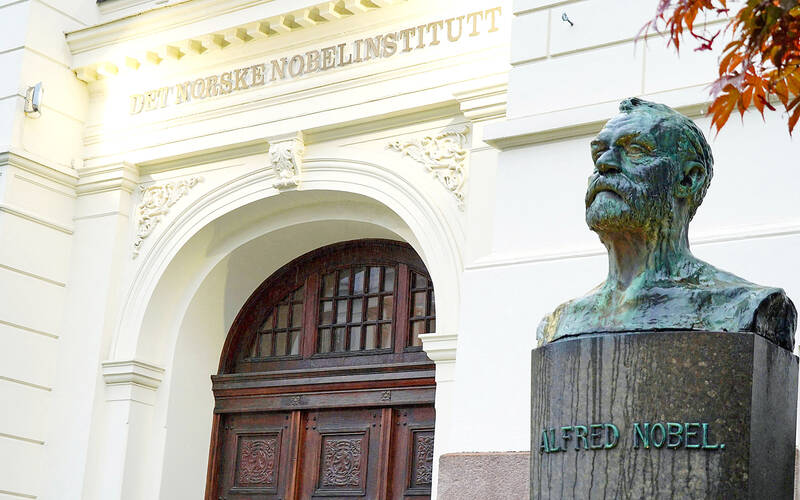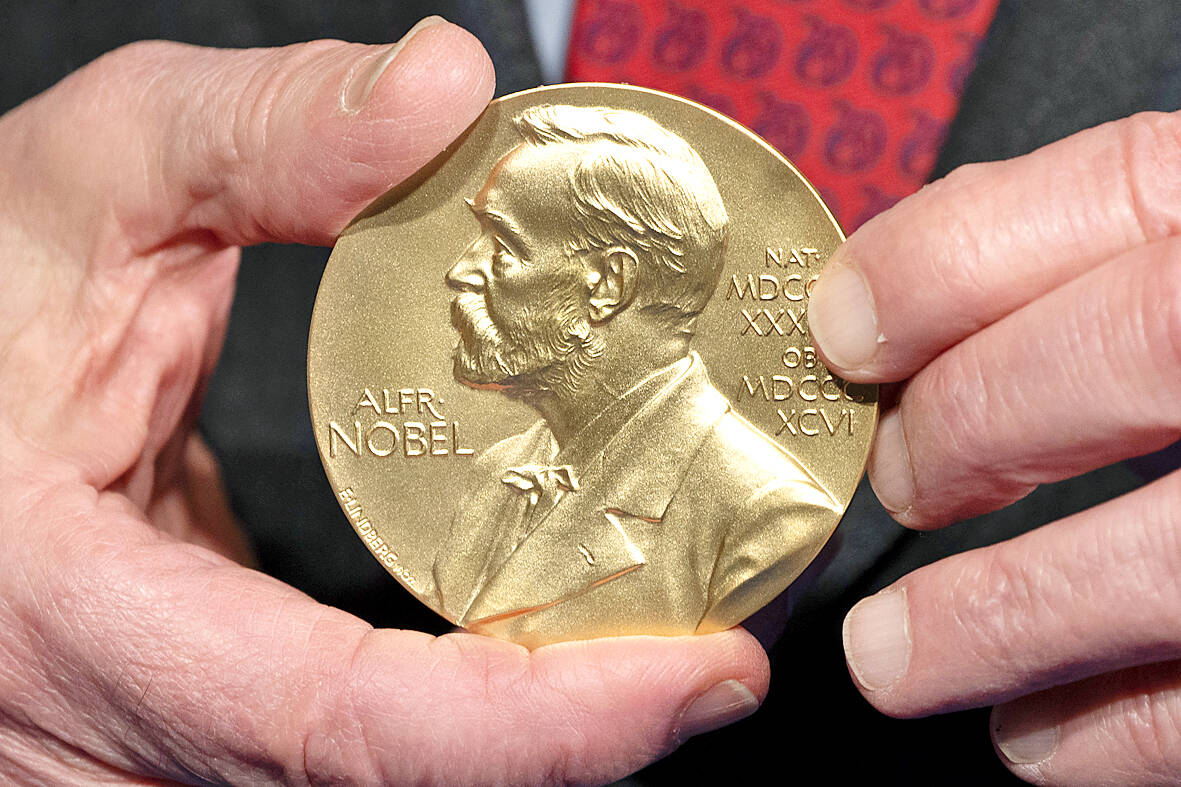Since 1901, the Nobel Prizes have been awarded to individuals and organizations for work leading to great advances for humanity, in line with the wishes of inventor Alfred Nobel.
The 2024 winners have been announced between Oct. 7 and yesterday, as follows.
Medicine prize

Photo: Reuters 照片:路透
The Nobel Prize in physiology or medicine was awarded to Americans Victor Ambros and Gary Ruvkun for their discovery of microRNA, tiny pieces of genetic material that alter how genes work at the cellular level, solving a decades-old mystery, and could lead to new ways of treating cancer.
The Nobel Assembly at the Karolinska Institute, which awarded the prize, said the duo’s discovery is “proving to be fundamentally important for how organisms develop and function.”
“Their groundbreaking discovery revealed a completely new principle of gene regulation that turned out to be essential for multicellular organisms, including humans,” the assembly said.

Photo: AP 照片:美聯社
Physics prize
John J. Hopfield and Geoffrey E. Hinton were awarded the Nobel Prize in physics for training artificial neural networks and laying the foundations for today’s machine learning applications.
Their work began in the 1980s, setting the stage for the current boom in AI that was enabled by an explosion of computing power and massive troves of training data.
Hopfield created an associative memory that can store and reconstruct images and other types of patterns in data, the Royal Swedish Academy of Sciences (RSAS) said. Hinton’s contribution was inventing a method that can autonomously find properties in data, and so perform tasks such as identifying specific elements in pictures.
Chemistry prize
Three scientists who discovered powerful techniques to decode and even design novel proteins — the building blocks of life — were awarded the Nobel Prize in chemistry. Their work used advanced technologies, including artificial intelligence, and holds the potential to transform how new drugs and other materials are made.
The prize was awarded to David Baker, a biochemist at the University of Washington in Seattle, and to Demis Hassabis and John Jumper, computer scientists at Google DeepMind, a British-American artificial intelligence research laboratory based in London.
Heiner Linke, chair of the Nobel Committee for Chemistry, said the award honored research that unraveled “a grand challenge in chemistry, and in particular in biochemistry, for decades.”
Literature prize
South Korean poet and novelist Han Kang was awarded the Nobel Prize in literature for a poetic and unsettling body of work that the Nobel committee said “confronts historical traumas and exposes the fragility of human life.”’
A slow-burning international literary star who has won multiple awards in South Korea and Europe, Han is the first Asian woman and the first South Korean writer to win the Nobel literature prize. She was awarded for books, including “The Vegetarian” and “Human Acts,” that explore the pain of being human and the scars of Korea’s turbulent history.
Peace prize
The Nobel Peace Prize was awarded to Japan’s Nihon Hidankyo, a grassroots movement of Hiroshima and Nagasaki survivors pushing for a nuclear weapons ban, as states like Russia threaten to use them.
Nihon Hidankyo was formed in 1956 by survivors of the attacks and victims of nuclear weapons tests in the Pacific amid demands for government support for health problems.
The group, received the honor “for its efforts to achieve a world free of nuclear weapons and for demonstrating through witness testimony that nuclear weapons must never be used again,” said Jorgen Watne Frydnes, the chair of the Norwegian Nobel Committee in Oslo.
Economics prize
The Nobel prize in economics was awarded to Turkish-American Daron Acemoglu and British-Americans Simon Johnson and James Robinson for research into wealth inequality between nations.
The trio was honored “for studies of how institutions are formed and affect prosperity.”
“Societies with a poor rule of law and institutions that exploit the population do not generate growth or change for the better. The laureates’ research helps us understand why,” the RSAS Nobel committee said.
“Reducing the vast differences in income between countries is one of our time’s greatest challenges,” Jakob Svensson, Chair of the Committee for the Prize in Economic Sciences, said, adding that their research has provided “a much deeper understanding of the root causes of why countries fail or succeed.”
(AP, AFP and Bloomberg)
諾貝爾獎是依據發明家阿爾弗雷德‧諾貝爾之遺願所設立,獎勵為人類進步做出重大貢獻的個人及組織,自1901年起開始頒發。
2024年之獲獎名單已於10月7日至14日公佈如下。
醫學獎
諾貝爾生理學或醫學獎授予美國人維克多.安布羅斯和加里.魯夫昆,以表彰他們發現microRNA(小分子核糖核酸)。這是一種小片段的遺傳物質,可以改變基因在細胞層面的機制,解決了數十年來的謎團,並可能為治療癌症帶來新方法。
負責頒發該獎項的卡羅林斯卡醫學院諾貝爾大會表示,兩人的發現「經證明對生物體的發育及運作至關重要」。
「他們的突破性發現揭示了一種全新的基因調控原理,該原理對於包括人類在內的多細胞生物至關重要」。
物理學獎
約翰.霍普菲爾德和傑佛瑞.辛頓以訓練人工神經網路,為現今的機器學習應用奠定基礎而獲諾貝爾物理學獎。
他們的研究自1980年代起展開,為當前人工智慧的繁榮奠定了基礎,而人工智慧的蓬勃發展得益於電腦運算能力的爆炸性成長,以及大量的訓練資料。
瑞典皇家科學院表示,霍普菲爾德創造了一種關聯式記憶,可以儲存與重建影像和其他類型的模式。辛頓的貢獻是發明了一種能自動發掘資料屬性的方法,因而能執行像是辨識圖像中特定元素的任務。
化學獎
三位科學家獲頒諾貝爾化學獎,他們發現了解碼甚至設計新型蛋白質—生命的基石—的強大技術。他們使用了包括人工智慧在內的先進技術,可能改變藥物開發和其他材料製造的方式。
該獎項頒發給美國西雅圖華盛頓大學的生物化學家大衛.貝克,以及位於倫敦的英美人工智慧研究實驗室 Google DeepMind 的電腦科學家傑米斯.哈薩比斯和約翰.江珀。
諾貝爾化學獎委員會主席海納.林克表示,此獲獎研究解決了「數十年來化學,特別是生物化學領域的巨大挑戰」。
文學獎
南韓詩人兼小說家韓江以其詩意而令人不安的作品獲頒諾貝爾文學獎,諾貝爾委員會稱這些作品「直面歷史創傷,揭露人類生命的脆弱」。
韓江是國際文壇上漸嶄露頭角的新星,曾在南韓及歐洲多次獲獎,是第一位獲得諾貝爾文學獎的亞洲女性,也是第一位獲得諾貝爾文學獎的南韓作家。她以《素食者》和《少年來了》等書獲獎,這些著作探討了人類的苦痛以及韓國動盪歷史的傷痕。
和平獎
諾貝爾和平獎授予日本原水爆被害者團體協議會(簡稱「日本被團協」)組織,這是由廣島和長崎原爆倖存者組成的草根運動,在俄羅斯等國家威脅使用核武之際,推動禁止核武。
日本被團協成立於1956年,由太平洋戰爭的倖存者及核武試驗的受害者組成,對其所受到的病痛傷害要求政府協助解決。
位於奧斯陸的挪威諾貝爾和平獎委員會主席約根.瓦特尼.弗里德尼斯表示,該組織「因致力實現無核武的世界,並且從親歷核彈爆炸者的經驗說明,世界絕對不能再使用核武」而獲獎。
經濟學獎
諾貝爾經濟學獎頒給土耳其裔美國人戴倫.艾塞默魯、英裔美國人賽門.強森及詹姆斯.羅賓森,以表彰他們對不同國家間財富不平等的研究。
這三人因「研究體制如何形成及其對景氣之影響」而獲獎。
「法治差的社會和剝削人民的體制不會帶來成長或變得更好。獲獎者的研究幫助我們理解其中的原因」,瑞典皇家科學院諾貝爾委員會表示。
諾貝爾經濟學獎委員會主席雅各布.斯文森表示:「縮小不同國家間收入的巨大差異是我們這時代面臨的最大挑戰之一」,並補充說,他們的研究「讓我們對收入差距的根本原因,以及為什麼國家會失敗或成功,有更深入的了解」。
(台北時報林俐凱編譯)

The Dutch introduced the Indian mango (Mangifera indica) to Taiwan in the 17th century. It is a green-skinned mango with thick fibers that get stuck in the teeth, but it boasts a rich aroma and a unique taste. In 1954, Taiwan’s Council of Agriculture introduced several mango cultivars from Florida, USA, including the Irwin, Haden, and Keitt varieties. After seven years of testing and domestication, the Irwin variety was chosen for promotion. Years later, the sample saplings started to bear fruit. These mangoes were large, with thin, vibrant red peels and golden pulp. The Irwin mangoes were mouth-wateringly sweet and

As the priest Antonius Hambroek stood in the dim chamber of Fort Zeelandia, his eldest daughter clung to him, her voice trembling. “Father, don’t go. They’ll kill you, and what will become of Mother and my sisters?” Outside, the sounds of Koxinga’s relentless canon siege boomed through the fortress. The defenders were on the brink of collapse. Starvation gnawed at their resolve, and the air carried the acrid stench of spent gunpowder and rotting flesh. Dutch reinforcements from Batavia had failed to arrive, leaving the garrison isolated and hopeless. Hambroek’s face was calm, though sorrow weighed heavily on his